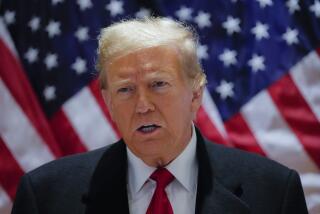Envoy reports ‘quantum leap’ in Russia-Georgia talks
Mediators succeeded Wednesday in getting direct talks going between Russia and Georgia, pressing the two neighbors to resolve security and refugee issues from their August war.
Johan Verbeke, special U.N. envoy for Georgia, said the sides had agreed on methods to demarcate borders and had begun work on security issues and the return of refugees.
“I’d call this a quantum leap,” Verbeke said. “All of the delegations did speak, all of the delegations listened.”
More than 160,000 people fled fighting that broke out Aug. 7 when Georgian forces launched an attack to regain control of the breakaway republic of South Ossetia. Russian forces repelled the attack, drove deep into Georgia and stayed there for weeks.
Russia still has thousands of troops in the breakaway Abkhazia republic and South Ossetia, and has recognized both as independent nations.
The United Nations refugee agency estimates that more than 30,000 people are still unable to return to their homes, and tensions in the regions remain high.
“There are places where ethnic clashes and ethnic hatred still prevail,” Russian Deputy Foreign Minister Grigory Karasin said.
His comments were mirrored by Georgian Deputy Foreign Minister Giga Bokeria, who said he feared “ethnic cleansing in those occupied territories where ethnic Georgians still live.”
An initial attempt at negotiations broke down last month, in part over disagreements on whether representatives from South Ossetia and Abkhazia should take part.
In all, eight parties met privately at the U.N.’s European headquarters here Wednesday and agreed to meet again next month, European Union representative Pierre Morel said.
Maxim Gvindzhiya of Abkhazia’s separatist government said his delegation and one from South Ossetia attended on an informal basis to keep the talks on track.
The other participants were the European Union, the U.N., Russia, Georgia, the U.S. and the Organization for Security and Cooperation in Europe.
U.S. Assistant Secretary of State Daniel Fried said: “There were productive discussions of some of the tough issues. [But] there remain vast areas of fundamental differences. There were and are a lot of people with guns . . . who just want to shoot.”
More to Read
Start your day right
Sign up for Essential California for news, features and recommendations from the L.A. Times and beyond in your inbox six days a week.
You may occasionally receive promotional content from the Los Angeles Times.






